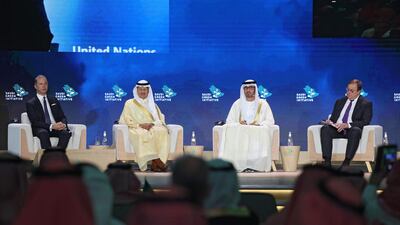Global efforts on climate change must adopt flexible solutions and climate action must not become an economic burden on developing nations, Dr Sultan Al Jaber, the UAE's Minister of Industry and Advanced Technology and UAE Special Envoy for Climate Change, said on Saturday.
A “one-size-fits-all” approach will not work and developing nations require solutions through finance, technology, incubation, policy and regulations to tackle the challenge of climate change, he said during the Saudi Green Initiative (SGI) forum in Riyadh.
“We need to accept the fact that the developing world requires a completely different set of policies and incentives. We cannot allow for climate action to become an economic burden, especially on developing nations, so we need to develop all kinds of instruments,” Dr Al Jaber said.
“It's going to take a mindset that is progressive, open, inclusive and ensures that the economics stays central in this discussion.”
Dr Al Jaber, who is also the chief executive of the state-owned Abu Dhabi National Oil Company, emphasised the importance of oil and gas in meeting the world's energy requirements and said that the “world has sleepwalked into a supply crunch” after under-investing in hydrocarbons over the past seven to eight years.
“We must come to terms with the realities on the ground: 80 per cent of the total energy requirements today come from fossil fuel; 60 per cent is well-presented by oil and gas. We can't just come out of nowhere and speak of energy transition and ignore or underestimate the impact of oil and gas in helping meet global energy requirements,” he said.
The UAE is committed to lowering its carbon emissions but the energy transition will take time, Dr Al Jaber said. The country said it aims to reach net zero emissions by 2050.
“The lowest carbon emitter and lowest cost producer will be the last barrel standing but this is going to take time, we must accept the fact that an energy transition is simply a transition and it's going to take time,” Dr Al Jaber said. “We need to be mature and sober in carrying out this discussion.
“We need to shift gears, we need to go back to the drawing board. While we accept the advancement of a very aggressive, ambitious approach towards a greener future supported by an energy mix, we must also include oil and gas because that is going to be mainstream and the spinal cord of our ability to meet the global energy requirements of the future.”
Saudi Arabia’s Energy Minister Prince Abdulaziz bin Salman also said international co-operation on technology will be “the cheaper way” to implement an energy transition.
“The world cannot operate without hydrocarbons, fossil fuels, renewables, none of these will be the saver – it has to be a comprehensive solution,” the energy minister said.
The meeting global leaders at the Cop26 in Glasgow at the end of the month must be open and inclusive about what countries are doing to contribute to carbon reduction without being “facetious about what's in their tool kit”, Prince Abdulaziz said.
For a successful Cop26 meeting, “we need to answer the challenge and not challenge the answers”, Dr Al Jaber said, as he called for a more flexible approach to tackle climate change issues.
“We all see the writing on the wall, we need Cop26 to help shift the discussion to being practical, to being solution-oriented, to being determined towards providing a flexible way of conducting business. We cannot be stuck to the fact that this is a multilateral arrangement and we have to have a one-size-fits-all approach, because that won't work,” he said.


